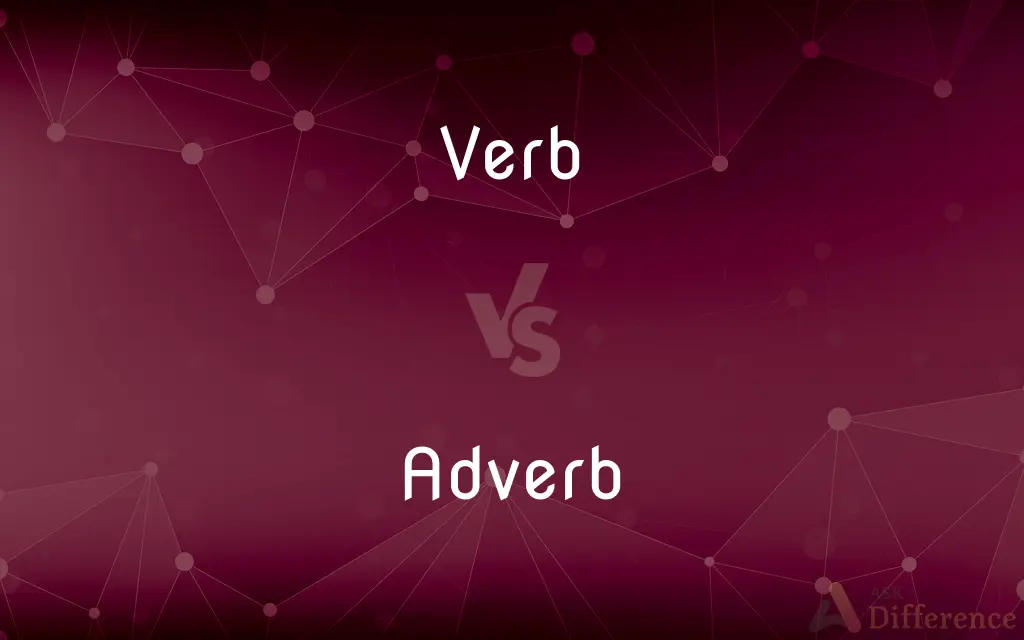Verb vs. Adverb — What's the Difference?
Edited by Tayyaba Rehman — By Fiza Rafique — Updated on September 21, 2023
A Verb is a word that describes an action, state, or occurrence, while an Adverb is a word that modifies a verb, adjective, or another adverb, often describing how, when, or where something happens.

Difference Between Verb and Adverb
Table of Contents
ADVERTISEMENT
Key Differences
A Verb is central to the structure of a sentence; it is what gives a sentence meaning in terms of action or state. Verbs can stand alone to convey the main activity happening in a sentence, such as "She runs."
On the other hand, an Adverb is a helper that cannot stand alone. It usually serves to provide additional information about a verb, an adjective, or another adverb in a sentence. For example, in the sentence "She runs quickly," the adverb "quickly" modifies the verb "runs."
In terms of form, many Verbs have different tenses and can be conjugated to match the subject and time of the action. For instance, "run" can become "ran" or "running."
Contrastingly, Adverbs do not have tenses and remain consistent in form. While verbs may require auxiliary words for different tenses, adverbs usually don't need such assistance.
Finally, it's crucial to remember that a Verb forms the backbone of a clause or sentence, dictating the subject's action or state. An Adverb, however, serves to refine or elaborate on the conditions under which this action or state occurs.
ADVERTISEMENT
Comparison Chart
Function
Describes action/state
Modifies verbs/adjectives
Standalone
Can stand alone
Cannot stand alone
Form Variations
Has tenses
No tenses
Sentence Role
Central to meaning
Provides additional info
Dependency
Independent
Dependent on other words
Compare with Definitions
Verb
Describes a state of being.
He is a teacher.
Adverb
Modifies a verb.
She quickly ran.
Verb
Signifies an occurrence.
Accidents happen.
Adverb
Modifies an adjective.
He is incredibly smart.
Verb
Can be transitive, requiring an object.
She reads books.
Adverb
Indicates time.
He arrived early.
Verb
A verb (from Latin verbum 'word') is a word (part of speech) that in syntax conveys an action (bring, read, walk, run, learn), an occurrence (happen, become), or a state of being (be, exist, stand). In the usual description of English, the basic form, with or without the particle to, is the infinitive.
Adverb
Indicates place.
She looked around.
Verb
A word used to describe an action, state, or occurrence, and forming the main part of the predicate of a sentence, such as hear, become, happen.
Adverb
An adverb is a word or an expression that modifies he a verb, adjective, another adverb, determiner, clause, preposition, or sentence. Adverbs typically express manner, place, time, frequency, degree, level of certainty, etc., answering questions such as how?, in what way?, when?, where?, and to what extent?.
Verb
Use (a word that is not conventionally used as a verb, typically a noun) as a verb
Any English noun can be verbed, but some are more resistant than others
Adverb
A word or phrase that modifies or qualifies an adjective, verb, or other adverb or a word group, expressing a relation of place, time, circumstance, manner, cause, degree, etc. (e.g., gently, quite, then, there).
Verb
The part of speech that expresses existence, action, or occurrence in most languages.
Adverb
The part of speech that modifies a verb, an adjective, another adverb, or an entire clause or sentence.
Verb
Any of the words belonging to this part of speech, as be, run, or conceive.
Adverb
Any of the words belonging to this part of speech, such as so, very, and rapidly.
Verb
A phrase or other construction used as a verb.
Adverb
(grammar) A word that modifies a verb, adjective, other adverbs, or various other types of words, phrases, or clauses.
Verb
(grammar) A word that indicates an action, event, or state of being.
The word “speak” is an English verb.
Adverb
(programming) In the Raku programming language, a named parameter that modifies the behavior of a routine.
Verb
(obsolete) Any word; a vocable.
Adverb
(rare) To make into or become an adverb.
Verb
(figurative) An action as opposed to a trait or thing.
Kindness is a verb, not an adjective. You're only kind if you do kind things.
Adverb
A word used to modify the sense of a verb, participle, adjective, or other adverb, and usually placed near it; as, he writes well; paper extremely white.
Verb
(programming) A named command that performs a specific operation on an object.
Adverb
The word class that qualifies verbs or clauses
Verb
To use any word that is or was not a verb (especially a noun) as if it were a verb.
Adverb
A word that modifies something other than a noun
Verb
To perform any action that is normally expressed by a verb.
Adverb
Modifies another adverb.
She sings very beautifully.
Verb
A word; a vocable.
Verb
A word which affirms or predicates something of some person or thing; a part of speech expressing being, action, or the suffering of action.
Verb
A word that serves as the predicate of a sentence
Verb
A content word that denotes an action or a state
Verb
A word indicating action.
She dances well.
Verb
Can be intransitive, not requiring an object.
He runs.
Common Curiosities
What is an Adverb?
An adverb is a word that modifies a verb, adjective, or another adverb.
Can a Verb stand alone?
Yes, a verb can convey the main action in a sentence by itself.
Do Verbs have tenses?
Yes, verbs can be conjugated into various tenses.
Can an Adverb stand alone?
No, adverbs are dependent on other words to provide context.
What is a Verb?
A verb is a word that describes an action, state, or occurrence.
Can a Verb be more than one word?
Yes, verb phrases consist of a main verb and auxiliary verbs.
Can Verbs be compound?
Yes, verbs can be compound, like "pick up" or "give in."
Do Adverbs have tenses?
No, adverbs do not have tenses.
Can you give an example of an Adverb?
An example of an adverb is "quickly."
Can Adverbs be compound?
Generally not, most adverbs are single words.
Can an Adverb be more than one word?
Generally no, but adverbial phrases can serve the same function.
Are all Verbs action words?
No, some verbs like "is" or "seems" describe states or occurrences rather than actions.
What's the role of an Adverb in a sentence?
An adverb provides additional information, often elaborating on how, when, or where an action occurs.
What's the role of a Verb in a sentence?
A verb forms the backbone of a sentence, indicating action or state.
Can you give an example of a Verb?
An example of a verb is "run."
Share Your Discovery

Previous Comparison
Adaptation vs. Acclimation
Next Comparison
Parasite vs. BacteriaAuthor Spotlight
Written by
Fiza RafiqueFiza Rafique is a skilled content writer at AskDifference.com, where she meticulously refines and enhances written pieces. Drawing from her vast editorial expertise, Fiza ensures clarity, accuracy, and precision in every article. Passionate about language, she continually seeks to elevate the quality of content for readers worldwide.
Edited by
Tayyaba RehmanTayyaba Rehman is a distinguished writer, currently serving as a primary contributor to askdifference.com. As a researcher in semantics and etymology, Tayyaba's passion for the complexity of languages and their distinctions has found a perfect home on the platform. Tayyaba delves into the intricacies of language, distinguishing between commonly confused words and phrases, thereby providing clarity for readers worldwide.














































